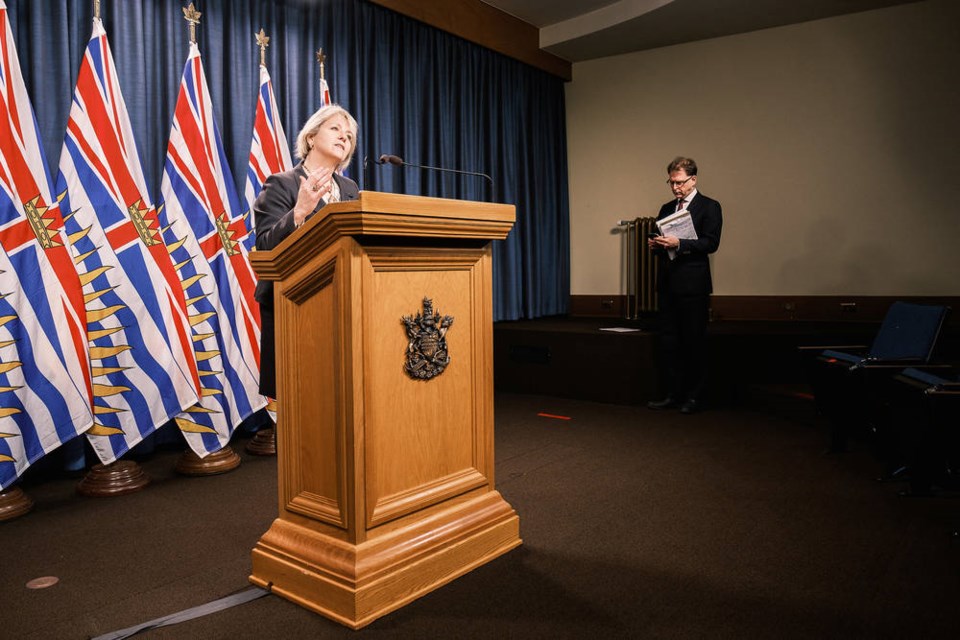Public health orders banning events and gatherings that include more than one household and restricting sports activities are being extended until Feb. 5, after a recent uptick in COVID-19 cases.
“Our curve is trending upward,” provincial health officer Dr. Bonnie Henry said Thursday, adding the province will take further action if it’s required. “This is our riskiest time right now.
“We cannot let our guard down. The vaccine is just beginning.”
The restrictions had been due to expire today.
Henry said health officials will continue to engage with faith and spiritual leaders and others on ways to support them over the next few weeks, as restrictions on gatherings continue.
Twenty-three new cases of COVID-19 were reported in Island Health on Thursday, a day after a record-high 28 cases were announced. There are now 152 active cases in the region — 53 in the south, 73 in the central region and 26 in the north.
Another 761 positive test results were reported in B.C. on Thursday, bringing the total number of active cases in the province to 6,349. Of those, 372 are in hospital, including 74 in intensive or critical care.
On the Island, eight are in hospital, including three in intensive care.
Another eight people with COVID-19 have died in B.C., for a total of 970.
The rise in new cases in every health authority shows some people are not following health orders, Henry said.
“Some people made the decision to make an exception for themselves,” she said.
“It may seem inconsequential, it may not have been done with the understanding of the impact it could have, but if 10,000 people — a few people in every town, every village or city in our province — make these small concessions for themselves, that increases all of our risk exponentially.”
Health orders banning social gatherings ensure schools and workplaces can continue to stay open, Henry said. “We know that transmission is less likely to occur in these controlled environments that have many layers of protection in place. It’s what we do outside of these environments … that is a concern.”
There are now three reported cases of the highly transmissible U.K. variant of COVID-19 in B.C., including the original case and two household contacts. The person who initially tested positive had returned to the Island from the U.K. on Dec. 15 and developed symptoms while in quarantine.
The person remained in isolation but the virus has now spread to two household members, said Henry, adding no one else is believed to be at risk. The province continues to test for the variant.
The arrival of the U.K. variant and changes in the virus in other parts of the world are a reminder of why it’s important not to travel, Henry said.
“This is a global pandemic,” she said. “A variant that arises in the U.K. affects us. Surges in Quebec, in Ontario, in our neighbours in Washington state and Alberta affect us.”
There are 51 outbreaks in long-term care and assisted living in B.C. involving 1,501 residents and 752 staff, including two in the Island Health region — Chartwell Malaspina Care Residence in Nanaimo and Ts’i’ts’uwatul’ Lelum Assisted Living in Duncan.
The province is updating its guidance governing visits to long-term care and assisted living centres, allowing for an essential visitor and a social visitor, with more information on how the two are defined. The information will be available on the B.C. Centre for Disease Control website, bccdc.ca.
“It is not a fundamental change in the number of visits or social visits, which continues to be the same, but it provides more clarity and consistency across long-term care homes of all kinds in B.C. around what is an essential visitor and how that policy will be applied,” said Health Minister Adrian Dix.
Of the 34,000 residents in licensed long-term care facilities in B.C., only about a quarter have visitors that have been granted essential status. Essential visitors could include a palliative care worker, a feeding assistant or someone helping a resident move in or out.
Henry said Thursday’s case count may be slightly higher because of a lag in data, expected to be reconciled over the next few days, as a result of streamlining of data information systems. The change will give B.C. Centre of Disease Control immediate results from labs around the province, rather than positive test results first being relayed to individual health authorities.
B.C. government website: COVID-19 province-wide restrictions



